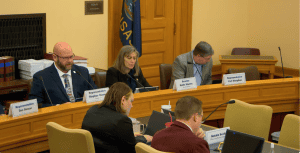The 14 states that didn’t implement Medicaid expansion are the fiscally responsible ones, Michael Cannon, Cato Institute director of health policy, said.
“Every state that has expanded Medicaid has exceeded their spending and enrollment projections, and now they’re struggling to continue,” Cannon said.
Cannon is in Topeka to take part in a three-day panel discussion on Medicaid expansion. More than two dozen people, including Kansas lawmakers, think tank experts, and hospital executives will continue the discussion today. Kansas is one of 14 states that hasn’t expanded Medicaid. Under the expansion program, adopted as part of Obamacare, the federal government picks up 90 percent of the tab for allowing non-disabled childless adults who meet certain income guidelines to utilize Medicaid. Expansion advocates in Kansas say failing to expand the program has resulted in Kansas leaving $3 billion in federal money on the table.
According to Cannon, that’s not how it works. That was money that was never added to the federal deficit.
“It’s $3 billion that the federal government never borrowed,” Cannon said. “I want to say thank you for not doing that. And for my children, thank you.”
Originally designed to assist the disabled, children and pregnant women, the Kansas Health Institute estimates that expanding Medicaid would add an estimated 90,000 able-bodied Kansans and another 39,000 children onto the Medicaid welfare rolls. Children are already eligible under regular Medicaid but publicity surrounding expansion is expected to result in more being signed up. Kansas would pay about 41 percent of the cost for already-eligible enrollees in 2020 based on estimates from the Kaiser Family Foundation.
Kansas Policy Institute’s Michael Austin said expanding the program would put the needs of able-bodied people above those of the neediest. There are currently 5,500 physically and mentally disabled Kansans on a waiting list for Medicaid services. The expansion program doesn’t allow the new federal funding to be used to eliminate the waiting list. Austin says expansion would divert state resources that could be used for people on the waitlist.
“And any new individuals eligible for traditional Medicaid, they would then have to compete against able-bodied adults for services,” he said.
Cannon said it’s clear the goal of expanding Medicaid isn’t to improve health care.
“We know that Medicaid expansion is not about improving health. If it were, then its advocates would not be saying, let’s blindly expand and hope for the best,” Cannon said. “They would be trying to measure and find out what it does.”
He pointed to an Oregon study that revealed no difference in physical health outcomes between those who received Medicaid and those who did not.
This isn’t lawmakers’ first look at expansion; in 2017, the Kansas Legislature passed Medicaid expansion, only to have it thwarted by Gov. Sam Brownback’s veto pen. Then, estimates suggested 150,000 able-bodied adults would be added to the program. KHI concluded expansion would cost Kansas about $47 million in its first year and up to $520 million over the next 10 years.
Advocates theorize those dollars would help rural hospitals and assist in economic development, but Cannon said Medicaid isn’t designed for that.
“Medicaid is a healthcare program,” he said. “The moment we start thinking about it as an economic development program, we should probably shut it down.”
The expansion hearings continue today at 1:30 p.m.



